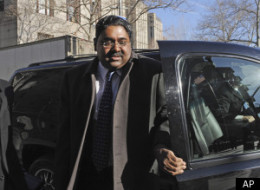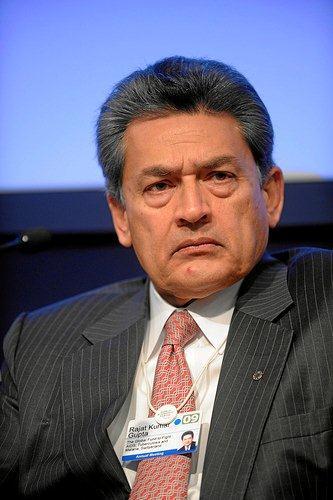
Jury selection starts Tuesday in the biggest insider trading trial in a generation, and the questions put to potential jurors get right to the heart of the matter: "How honest do you think Wall Street Executives are?"
Raj Rajaratnam, the billionaire Galleon Group founder accused of making $45 million trading on illegal stock tips, plans to take the witness stand himself during the trial, the NYTreports. If convicted, Rajartnam faces up to 20 years in prison.
Meanwhile, Rajartnam's defense team is trying to weed out any jurors who might feel any antipathy towards Wall Street. Another hurdle the defense faces is finding jurors who are still unfamiliar with the case, which is sure to be one of the most closely watched in Wall Street's history.
The New York Post reports that defense lawyer John Dowd has already criticized the timing of the SEC's complaint against former Goldman Sachs director Rajat Gupta -- accused of passing tips about Warren Buffett's investment plans in Goldman Sachs to Rajaratnam -- saying it was intended to taint the jury pool. From the Post:
Dowd says he tried in vain to stop the action with a letter to SEC chief Mary Schapiro on Monday, saying the SEC action against Gupta the week before the trial would "play havoc with jury selection and Mr. Rajaratnam's Sixth Amendment rights" to a fair trial.
In addition to more standard questions concerning jurors' educational level and background, the form (printed in full below) asks:
*Hedge Funds have been reported in the news over the past few years. Do you have any feelings concerning this industry? ____ Yes ____ No If Yes, please describe your feelings:
*Have you ever invested in a Hedge Fund(s)? ____ Yes ____ No
If Yes, were you satisfied with your investment? ____ Yes ____ No
*How honest do you think Wall Street Executives are? 1 Not at All Honest 2 Below Average Honesty 3 Average Honesty 4 Above Average Honesty5 Extremely Honest Please explain your answer.
*Do you have any feelings about Wall Street Executives? ____ Yes ____ No Do you feel it more likely than not that, if accused of impropriety, a Wall Street Executive is probably guilty? ____ Yes ____ No Do today's Wall Street Executives lack integrity? ____ Yes ____ No Are today's Wall Street Executives greedy? ____ Yes ____ No If accused of insider trading, is it more likely than not that a Wall Street Executive is guilty?
The biggest Wall Street insider trading criminal case in a generation goes to trial on Wednesday, when prosecutors open their case against Galleon Group founder Raj Rajaratnam whose arrest 16 months ago shook the hedge fund world.
A jury of New Yorkers will hear prosecutors outlining how they believe Sri Lankan-born Rajaratnam broke the law by designing a complex web of stock tippers who helped him reap $45 million in illicit profit between 2003 and March 2009.
For the first time, the jury and observers of the high-profile case will be given an insight into the defense trial strategy, which faces seemingly overwhelming evidence of leaked corporate secrets, tapped telephones and friends-turned-government witnesses.
"The defense doesn't really get to show the whole picture until the trial and then it really can be quite different and end up with surprising results," said Stuart Gasner, securities fraud defense lawyer at Keker & Van Nest law firm in San Francisco and a former prosecutor.
The selection of a jury of 12 and six alternates began on Tuesday and is expected to be completed on Wednesday. Presiding U.S. District Judge Richard Holwell sent prospective jurors home with a warning not to read anything about the highly-publicized case. He then told prosecutors and Rajaratnam's multimillion dollar defense team that opening statements would go ahead "for sure" on Wednesday.
Since arresting 53-year-old U.S. citizen Rajaratnam in October 2009 and announcing criminal charges against 26 former traders, executives and lawyers, the U.S. government has pressed ahead with what it calls the biggest probe of insider trading in the $1.9 trillion hedge fund industry.
Nineteen people have pleaded guilty in the Galleon case. It stands apart from past insider trading investigations because of the government's wide-scale use of phone taps. As many as 173 audio recordings will be played to the jury during the two-month long trial.
Rajaratnam was mobbed by photographers and TV crews when he walked into the courthouse on Tuesday morning and as he left at the end of the day. Dressed in a brown coat and a suit, he said nothing on both occasions. Chief defense lawyer John Dowd has argued in court papers that prosecutors have broadened the definition of insider trading. He said a money manager's liberty should not be at risk because he trades on a stock while knowing something about the company.
The burden of proof is on prosecutors to convince the jury that their evidence shows Rajaratnam knew he was trading on confidential information provided by someone who had a fiduciary duty not to disclose it.

In the week before the trial, U.S. market regulators and prosecutors uncorked allegations against Rajaratnam's friend and former Goldman Sachs Group Inc director Rajat Gupta. They described phone calls in which he tipped Rajaratnam about confidential Goldman information before it became public.
Gupta faces a civil proceeding brought by the U.S. Securities and Exchange Commission but he has not been criminally charged. Lloyd Blankfein and David Viniar -- the Goldman Sachs chief executive and chief financial officer -- were on a list of people who might testify or be mentioned during the trial.
The case is USA v Raj Rajaratnam, U.S. District Court for the Southern District of New York, No. 09-01184. (Reporting by Grant McCool, editing by Andrew Marshall)
The SEC has decided to sue Rajat Gupta for insider trading: he allegedly passed on inside information of the Boards of Goldman Sachs and Procter & Gamble to his hedge fund friend Raj Rajaratnam, the manager of the Galleon hedge fund, now under bail.
I have known Rajat Gupta like many of us for over a decade, and often sought his advice on important matters. He is one of the most iconic Indian-American executives and made his career advising companies and ultimately running the "Vatican of Capitalism", McKinsey. "McKinsey is the closest thing the business world has to a confessional and he (Gupta) was the high priest" one US business school dean was quoted saying inBusiness Week. For a firm that thrives on its reputation, proximity to misdeeds of this sort could be fatal, according to former McKinsey consultants who spoke on the condition of anonymity. Former senior partner at consulting firm McKinsey & Co. Anil Kumar pleaded guilty to sharing secrets about clients and receiving $2 million in payments from his friend Rajaratnam, who has denied the assertion.
It is therefore for many of us a huge disappointment to see him involved in one of the dumbest things one could do on Wall Street.
I tried to figure out how this happened concretely and picked two examples from the TheStreet.com, a well known industry watcher and participant. They are absolutely damning for Rajat. Goldman Sachs CEO Lloyd Blankfein has agreed to testify for the prosecution in the trial that will start next week.
SEC alleges that Gupta took part in a special meeting of the Goldman Sachs board during the height of the 2008 financial crisis that considered, and eventually won, a $5 billion injection by Warren Buffett's Berkshire Hathaway. That meeting ended around 3:53 p.m. By 3:57 p.m., the SEC says, Gupta had placed a call to Rajaratnam and Galleon had snapped up 175,000 shares of Goldman Sachs before the Buffett news hit the streets. A $900,000 trade was completed in less than four minutes.A more profitable and equally impressive Goldman Sachs trade took place earlier in the year when, according to the SEC, Gupta tipped off Galleon to the fact that Goldman Sachs would have a better than expected quarter. Rajaratnam hit the markets immediately, snapping up 5,500 out-of-the-money Goldman options and more than 350,000 Goldman shares. When Galleon dumped the options in June -- just after the Goldman earnings announcement --they made a profit of $13.6 million.
There are several lessons to this sad story.
The first one is that Wall Street never learns and that even the smartest and the best act as if the rules apply to everybody, except to them. Insider trading never was totally eradicated after the Michael Milken Drexel Burnham Lambert story.
The second one is about greed. Most scandals of that type are performed by people who are wealthy: that is definitely the case of Rajat Gupta, and for that matter Bernie Madoff or Ramalinga Raju. Michael Milken cashed the same year a bonus of $500 million. There seems to be a run for more money that is gripping the imagination of the smartest and the wealthiest make them commit mistakes and forget any basic rule of prudence. Have they translated their super-ego into a dollar number?
The third one is more painful: this is happening on a large scale in India. The regulatory structure makes it possible for Board Members to benefit from their inside knowledge and that form of insider trading seems to be acceptable. In the meantime, the case has rocked not just Indian and NRI corporate circles but also Wall Street, where Gupta is highly-regarded as a management icon who epitomized immigrant industry and success.
The fourth one is whether Rajat Gupta was a victim of his friend or benefited from it. "Let me assure you, I have done nothing wrong. The SEC's allegations are totally baseless. I am informed by my lawyers that the case is based on speculation and unreliable third hand hearsay. Just to be clear: there are no tapes or any other direct evidence of me tipping Mr. Rajaratnam. I did not trade any of the securities involved, nor did I share in any of Mr. Rajaratnam profits" Gupta wrote in an e-mail to the Dean of the Hyderabad-based Indian School of Business (of which he is a co-founder) which was forwarded to the faculty and alumni. We all hope that this is true. It is however carefully worded: was Rajat an investor in the hedge fund? Does it matter whether he personally benefited if he betrayed his fiduciary responsibility as a Director?
In today's world, leaders, especially when they are iconic, are expected to display the highest standards of ethical behavior. Let's not let the lesson go without seriously reflecting on the standards that, beyond the letter of the law, we are expected to display.
No comments:
Post a Comment